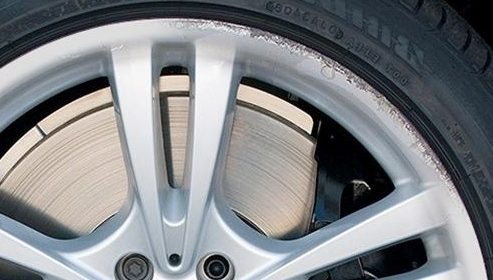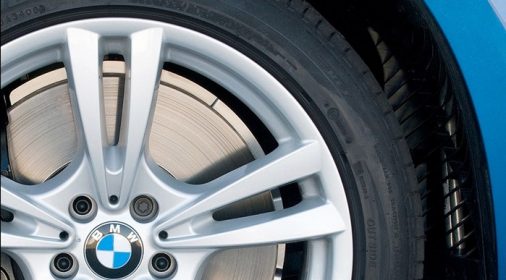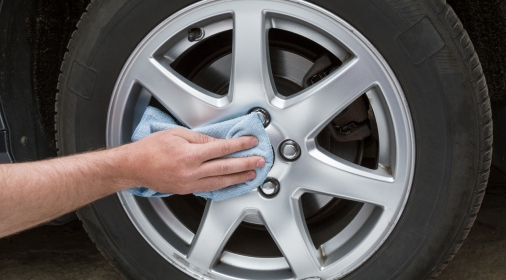Buckled Alloy Wheels: Causes, Signs & Solutions
Damaged alloy wheels can be disheartening but we have the solution for you, alloy wheel straightening.
What is a Buckled Wheel?
A buckled wheel refers to a wheel that has become warped, bent, or distorted, typically due to a heavy impact such as hitting a pothole, mounting a curb at speed, or driving over rough terrain. Unlike surface damage like scratches or scuffs, a buckled wheel affects the structure of the wheel itself, often resulting in vibration, poor handling, or even a visible wobble while driving.
Buckling can occur on alloy or steel wheels, but buckled alloys are more prone to this kind of damage. You might not always notice a buckle straight away, but symptoms often include:
-
Steering wheel vibrations, especially at higher speeds
-
Uneven tyre wear
-
Poor alignment or tracking
-
In some cases, air loss from the tyre due to an imperfect seal with the rim
Driving on a buckled wheel can be unsafe, as it affects the car’s stability and can lead to further damage to the suspension or steering system. That’s why it’s important to have the wheel inspected and, if possible, professionally repaired or replaced as soon as possible.
How do alloy wheels bend and become damaged?
Damaged and bent alloy wheels are usually caused from some sort of impact to the wheel, this could be a pesky pot pole in the road, a kerb that you didn’t see, speed bumps you forgot to slow down for and any other kind of obstruction. Unfortunately, alloy wheels are less durable than other types of wheels such as steel, resulting in damage occurring much more frequently. In many cases, this damage can lead to a buckled alloy wheel.
What are the signs of a bent/damaged wheel?
Other than visually obvious damage, it’s not always easy to spot a bent alloy wheel. However, you will most definitely feel it. There are a few signs to look out for that could mean your alloys have been damaged. Vibrating and shaking is usually the first sign you will notice. The damage may cause the tire to make uneven contact with the ground which results in the shaking and vibrating of the car. You may also feel like you are losing control of the car. Whether it be the way the steering feels or the general performance of the car. You know your car better than anyone, any signs of unusual performance are an immediate red flag. Another sign you may notice is that your tyres are deflating quickly and on a more regular basis than usual.
Is it safe to drive with a bent alloy wheel?
The immediate answer is no! As soon as you spot or feel any possible signs of a bent or buckled alloy wheel you should get it repaired straight away. A bent wheel can be extremely dangerous, not only because it may pop the tyre which could result in a complete blow out at high speed, you may also lose control of the car which could put you and others at serious risk.
What shall I do if I have a bent alloy wheel?
If you notice a bent or damaged alloy wheel, you will need to get it repaired as soon as possible. Replacing alloy wheels can be very expensive and often isn’t necessary. Instead, you can get them straightened! Wheel straightening is an affordable, quick solution to the problem, and in many cases, a more practical alternative to replacement.
How Are Buckled Alloy Wheels Repaired?
When it comes to dealing with a buckled alloy wheel, the right solution depends on the extent and location of the damage. In most cases, professional assessment is necessary to determine whether a wheel can be safely repaired or if replacement is the only viable option. Below are the common buckled alloy wheel repair options available:
1. Minor Straightening
For wheels with light buckling or mild distortion, a process known as wheel straightening can often be used. Specialist equipment is employed to measure the wheel’s run-out (the amount of bend or warp) and gently apply pressure to realign it to factory standards. This method is ideal when:
-
The buckle is on the inner rim or barrel
-
There’s no cracking or structural compromise
-
The wheel holds air pressure properly
Alloy wheel buckle repair straightening is generally cost-effective and quick, restoring drivability and eliminating vibrations caused by the buckle.
2. Alloy Wheel Repair
When a buckle is accompanied by surface damage, such as scuffs, gouges, or minor cracks, additional buckled alloy wheel repair techniques may be used. This can include:
-
Welding to fix small cracks or fractures
-
Refinishing to restore cosmetic appearance
-
Lathe machining for precision and balance
This more comprehensive approach is often used when the wheel has both cosmetic and structural issues, but is still deemed safe to repair.
3. Wheel Replacement
In cases of severe buckling, where the wheel’s structural integrity is compromised or the cost of fixing a buckled alloy wheel outweighs the benefits, replacement is the safest option. Indicators that a wheel needs replacing include:
-
Deep cracks or splits that can’t be welded
-
Multiple buckles across the rim
-
Failure to hold tyre pressure even after attempted repair
-
Risk of further damage to tyres or suspension components
While replacement is more expensive, it guarantees roadworthiness and safety, especially when dealing with high-performance or heavily damaged wheels.
FAQs
Can a buckled alloy wheel be straightened?
Yes, in many cases a buckled alloy wheel can be professionally straightened using specialist equipment, particularly if the damage is minor and hasn’t compromised the wheel’s structure.
Is it safe to repair a buckled alloy wheel?
Yes, if repaired by a trained professional. Safety is always the top priority, and reputable repair specialists will only fix buckled alloy wheels that can be safely restored to roadworthy condition.
Is it worth repairing buckled alloy wheels?
In most cases, yes. Repairing a buckled wheel is often far more cost-effective than replacing the entire wheel, especially when the damage is minor and hasn’t caused cracks or leaks.
Is a buckled wheel an MOT failure?
It can be. A visibly buckled wheel that affects the vehicle’s handling, tyre seating, or overall safety may lead to an MOT failure. It’s best to get it checked before your test.
Need Help? ChipsAway Can Assist
If you suspect your alloy wheel is buckled or structurally damaged, it’s important to have it inspected by a qualified wheel specialist. Once any necessary mechanical repairs or replacements have been completed, ChipsAway can help restore the appearance of your wheel. Our nationwide network of specialists is experienced in high-quality cosmetic alloy wheel and paintwork repairs, helping to return your wheels to a great-looking finish after damage has been addressed. We’re here to help your car look its best once it’s safe to be back on the road. To get a free repair estimate, you can give us a call on 0800 145 5118 or complete the online form here.










